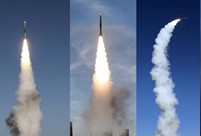

The China-initiated multilateral bank that has dominated media headlines for months took a key step forward on Monday, with the signing of an agreement that outlines the legal framework and management structure for the institution.
Representatives of the 57 prospective founding countries gathered in Beijing for the signing ceremony of the Asian Infrastructure Investment Bank (AIIB) in the Great Hall of the People. Australia was the first country to sign the document.
The 60-article agreement specified each member's share as well as governance structure and policy-making mechanism of the bank, which is designed to finance infrastructure in Asia.
The bank will have authorized capital of 100 billion U.S. dollars, and Asian countries will contribute to up to 75 percent of the total capital. Each member will be allocated a share of the quota based on their economic size, according to the agreement.
China, India and Russia are the three largest shareholders, taking a 30.34 percent, 8.52 percent, 6.66 percent stake, respectively. Their voting shares are calculated at 26.06 percent, 7.5 percent and 5.92 percent.
China's Vice Finance Minister Shi Yaobin said in an interview with Xinhua that the country's stake and voting share in the initial stage are "natural outcome" of current rules, and may be diluted as more members join.
"China is not deliberately seeking a veto power," Shi stressed.
Speaking at Monday's ceremony, Finance Minister Lou Jiwei said the new bank will uphold high standards and follow international rules in its operation, policy-making and management to ensure efficiency and transparency.
The AIIB was proposed by President Xi Jinping in October 2013. A year later, 21 Asian nations, including China, India, Malaysia, Pakistan and Singapore, had signed an agreement to establish the bank, which will be headquartered in Beijing.
Since the new bank garnered support from countries like Britain and Germany, much focus has been trained on whether the U.S. and Japan, the world's largest and third largest economies, will join the club.
While stating that the U.S. will not join the AIIB at present, U.S. President Barack Obama said in April that the U.S. looked forward to collaborating with the new development bank, "just like we do with the Asia Development Bank and with the World Bank."
Despite outside worries that a new investment bank will challenge the established order of multilateral lenders, the IMF, World Bank and other leading global lenders have welcomed collaboration with the new bank to fill Asia's infrastructure gap.
Statistics from the Asian Development Bank (ADB) show that between 2010 and 2020, around 8 trillion U.S. dollars in investment will be needed in the Asia-Pacific region to improve infrastructure.
Rather than being a competitor, the new bank will complement the current international economic order and enable China to take more global responsibility, Chinese officials have reiterated.
The bank will start operation at the end of the year under two preconditions: At least 10 prospective members sign the agreement, and the initial subscribed capital is no less than 50 percent of the authorized capital.
 4-year-old cute 'monk' spends summer holiday in temple
4-year-old cute 'monk' spends summer holiday in temple College graduates shining on the red carpet in Nanjing
College graduates shining on the red carpet in Nanjing PLA soldiers launch guided missiles in confrontation exercise
PLA soldiers launch guided missiles in confrontation exercise One woman’s fight against dog eaters
One woman’s fight against dog eaters Beautiful and smart - post-90s college teacher goes viral
Beautiful and smart - post-90s college teacher goes viral Top 10 luxury houses in the world
Top 10 luxury houses in the world  National Geographic: best photos during journey
National Geographic: best photos during journey Couples who engage in meaningful and deep conversations are happier
Couples who engage in meaningful and deep conversations are happier Maldives resort rated best hotel of 2015
Maldives resort rated best hotel of 2015  Global attitude poll reinforces old thinking
Global attitude poll reinforces old thinking Luxembourg scholar explodes myths about Tibet independence
Luxembourg scholar explodes myths about Tibet independence Smuggled meat came via Vietnam: official
Smuggled meat came via Vietnam: official Mentally ill confined at home due to lack of resources and public education
Mentally ill confined at home due to lack of resources and public educationDay|Week